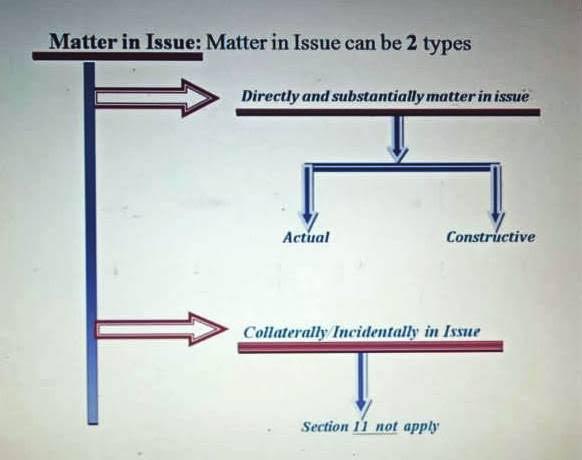 Res Judicata under Section 11 of the Code of Civil Procedure, 1908
Res Judicata under Section 11 of the Code of Civil Procedure, 1908
Meaning & Origin
The term Res Judicata comes from Latin, where “Res” means thing or matter and “Judicata” means adjudged or decided.
In simple terms, it is a legal doctrine that prevents the re-litigation of a matter already decided by a competent court.
This doctrine is based on three maxims:
1. Nemo debet bis vexari pro una et eadem causa – No person should be vexed twice for the same cause.
2. Interest republicae ut sit finis litium – It is in the interest of the State that litigation must come to an end.
3. Res judicata pro veritate occipitur – A judicial decision must be accepted as correct.
Statutory Provision
Section 11 CPC states:
“No Court shall try any suit or issue in which the matter directly and substantially in issue has been directly and substantially in issue in a former suit between the same parties, or between parties under whom they or any of them claim, litigating under the same title, in a Court competent to try such subsequent suit or the suit in which such issue has been subsequently raised, and has been heard and finally decided by such Court.”
The section contains eight explanations clarifying terms like “former suit”, “competence of court”, “constructive res judicata”, and application in execution proceedings.
• Conditions for Application
For res judicata to apply, the following must be satisfied:
1. The matter must be directly and substantially in issue in both suits.
2. The prior suit must be between the same parties or their legal representatives.
3. The parties must have litigated under the same title.
4. The earlier court must have been competent to try the later suit.
5. The matter must have been heard and finally decided.
✓ Matter in Issue
Types of Issues
• Issue of Fact – Always operates as res judicata.
• Issue of Law – Only when connected with facts.
• Mixed Issue of Fact & Law – Also operates as res judicata.
The Supreme Court in Mathura Prasad v. Dossibai held that a decision on a point of law operates as res judicata if it is not independent of the facts of the case.
• Classification
1. Directly and Substantially in Issue
Essential for the decision of the case.
Example: Dispute over ownership or tenancy in an eviction case.
2. Collaterally or Incidentally in Issue
Side issues arising in the case; findings here do not bar re-litigation.
√ Constructive Res Judicata
(Explanation IV to Section 11 CPC)
If a party could and should have raised a ground in a previous suit but did not, the law will treat it as if it had been raised and decided.
Test:
• Is the present issue connected to the earlier suit?
• Could and should it have been raised earlier?
• Was it known or discoverable with due diligence?
Example: State of U.P. v. Nawab Hussain – Second suit on a new ground barred because it could have been raised earlier.
∆ Parties Covered
• Same Parties – Even if roles are reversed (plaintiff ↔ defendant).
• Co-defendants & Co-plaintiffs – If there was a necessary conflict decided in the earlier suit.
• Parties Claiming Under Same Title – Through sale, gift, succession, will, lease, etc.
• Representative Suits – Under Explanation VI, bona fide litigation on public/common rights binds all interested parties.
• Competency of Court
The competence of the former court is judged as on the date of the first suit.
It can be:
• Exclusive jurisdiction courts (e.g., Revenue Court).
• Limited jurisdiction courts (decision still binding).
• Concurrent jurisdiction courts.
✓ Final Decision Requirement
Res judicata applies only if the earlier decision was on merits, including:
• Ex parte decrees (if on merits).
• Decrees on awards.
✓ No res judicata if dismissed for technical reasons like:
• Lack of jurisdiction
• Non-joinder of parties
• Improper valuation
• Premature suit
Special Points
• Withdrawal of suit – No bar.
• Compromise decree – Not res judicata, but estoppel may apply.
• Appeal pending – Decision loses finality; becomes res sub judice.
• Not applicable to Habeas Corpus petitions.
• Res Judicata vs Estoppel
Res Judicata:-Based on court’s decision
Estoppel:-Based on party’s conduct
Res Judicata:-Public policy – end litigation
Estoppel:-Equity – prevent inconsistent statements
Res Judicata:-Bars jurisdiction
Estoppel:-Rule of evidence
Res Judicata:-Binds both parties
Estoppel:-Binds only the party making earlier representation
∆ Exceptions
1. Waiver of plea.
2. Interlocutory orders.
3. Dismissal of SLP without reasons.
4. Different cause of action.
5. Judgment by fraud or collusion.
6. Court lacking jurisdiction.
7. Change in law creating new rights.
✓ Leading Cases
• Daryao v. State of U.P. – Writ under Article 32 barred after dismissal under Article 226.
• State of U.P. v. Nawab Hussain – New ground in later suit barred.
• Devilal Modi v. STO – Second writ petition on new grounds barred.
• Sulochana Amma v. Narayanan Nair – Even limited jurisdiction courts’ decisions can bind.
Conclusion
The doctrine of res judicata is a cornerstone of civil justice. It ensures finality of litigation, prevents multiplicity of suits, and protects the authority of judicial decisions. However, its application must balance justice and fairness, avoiding injustice under the guise of finality.
✓ To start your preparation for Judicial Services Examination at home, drop a message on WhatsApp +91 8840961324 or call us on +91 9151591324
At Theory of Abrogation, we equip you with everything you need:
•Subject-wise expert classes
•Mock test series
•Legal current affairs
•Personalized mentorship for interview preparation
“Your law degree is your foundation, but your preparation is what will build your success.”
Join Our New Batch Now!
Prepare smart. Prepare with Theory of Abrogation.
Contact Us:
B-109, Commercial
Complex Dr. Mukherjee
Nagar, Delhi-09
+91 9971399324 | +91 8840961324
[email protected]
